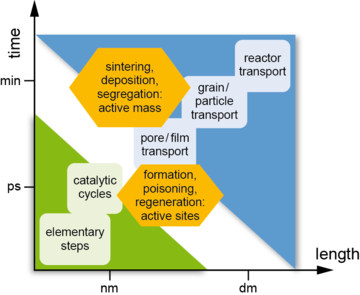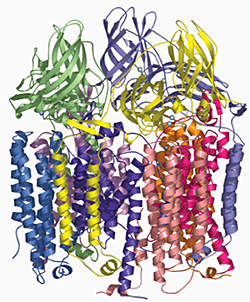D1/E1 - Activation of Methane
A profound understanding of the activation of methane requires a description of chemical and physical processes over a wide range of space and time dimensions:
- the identification of elementary steps and catalytic cycles through theoretical and experimental studies on model systems
- the coupling of these molecular processes with transport of energy and molecules in meso- and macroscopic dimensions
- the chemical transformation of catalyst precursors into active phases, during which deactivation by compound formation, poisoning and reactant-induced restructuring may occur.
D1 Chemical activation of methane
The chemical activation of methane is done within the framework of oxidative coupling of methane (OCM). We persue a multi-scale approach that combines concepts and methodologies of chemical synthesis, physical chemistry and surface science with chemical engineering.
Our first research package is devoted to the experimental and theoretical analysis of homogeneous (gas phase) processes, extended over all relevant dimensions of transport, to achieve a comprehensive kinetic description based upon observables or theoretically verified input data.
The existing family of reaction models will be validated and combined with our second research package, dedicated to identifying the relevant surface reactions, determine the concomitantly released heat, and identify the species that are dissociated from the surface to activate the gas phase reaction.
Project team
Dau, Driess, Freund, Görke, Hildebrandt, Kaupp, Kraume, Krähnert, Limberg, Ray, Risse, Sauer, Scheffler, Schlögl, Schomäcker, Schwarz, Thomas, Wozny.
Former team members: Enders, Fielicke, Horn, Greco, Knorr, Meijer, Schubert, Sierka.
Main investigators are given in bold.Dau, Holger
E1 - Biological activation of C-H bonds
In nature microorganisms are able to catalyse the oxidative degradation of methane with high efficiency. These enzymes (methane monooxygenases - MMOs) are studied by our cooperation partner at Northwestern University in Evanston (USA) by the group of Amy C. Rosenzweig.
Our present studies aim for the synthesis of bioinspired models for the hydroxylation of methane, focussing on functional bioinspired models.
Highly relevant compounds, bearing the [Cu-O-Cu]2+ subunit proposed to be a functional model for the Cu-based MMO, will be probed with respect to activation of O2 for selective methane monooxygenation (D1-2).
They may further be used as a prototype for the immobilisation of a molecular (bioinspired) catalyst on mesoporous support materials, thereby combining aspects of homogeneous, heterogeneous, and biological catalysis.


